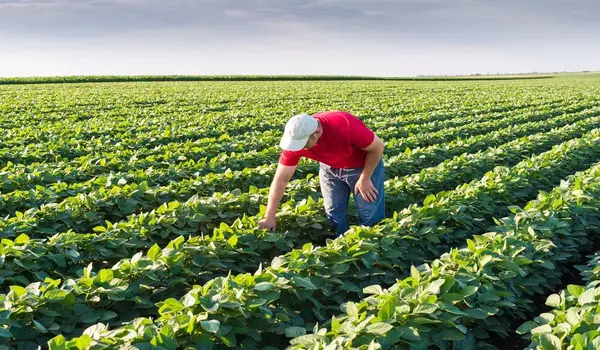Sustainable farming is a method of agriculture that focuses on producing food in a way that preserves the environment, promotes biodiversity, and supports the health of the ecosystem. In contrast to conventional farming, which often relies on synthetic fertilizers, pesticides, and intensive land use, sustainable practices emphasize long-term environmental stewardship. This approach not only ensures food production but also helps protect and restore the environment. In this blog, we will explore the environmental benefits of sustainable farming practices and how they contribute to the preservation of natural resources, reduction of pollution, and promotion of a healthier ecosystem. One of the key environmental benefits of sustainable farming is the improvement of soil health. Healthy soil is critical for long-term agricultural productivity, but conventional farming practices such as monoculture and excessive use of chemical fertilizers can deplete soil nutrients and lead to erosion. Sustainable farming techniques like crop rotation, cover cropping, and reduced tillage help preserve and even improve soil structure and fertility. Crop Rotation: Rotating crops prevents the depletion of specific nutrients from the soil, which would otherwise happen if the same crop were planted repeatedly. By alternating between crops that have different nutrient requirements, farmers can maintain a balanced nutrient level in the soil, reducing the need for chemical fertilizers. Cover Cropping: Planting cover crops during the off-season helps protect the soil from erosion, keeps it enriched with organic matter, and prevents weed growth. Cover crops like legumes also fix nitrogen in the soil, contributing to natural soil fertility. These practices not only protect the soil from degradation but also enhance its ability to support plant growth, reduce erosion, and limit the need for synthetic fertilizers, contributing to a more sustainable agricultural system. Water is one of the most critical resources in agriculture, and unsustainable farming practices can lead to water waste and contamination. Sustainable farming focuses on efficient water use, minimizing waste, and protecting water quality. Drip Irrigation: This system delivers water directly to the plant roots, reducing evaporation and water runoff. It is much more efficient than traditional irrigation methods, which often waste significant amounts of water. By using less water to grow crops, sustainable farming helps conserve this precious resource. Water Recycling: Some sustainable farms incorporate water recycling systems that capture and reuse water, reducing the overall consumption of fresh water. This not only conserves water but also prevents the runoff of fertilizers and pesticides into local water bodies. Soil Moisture Retention: Practices like mulching and adding organic matter to the soil can improve its ability to retain moisture. This reduces the need for frequent irrigation and helps crops withstand periods of drought. By implementing these practices, sustainable farming reduces water waste, prevents the contamination of rivers and lakes with agricultural runoff, and promotes more responsible water use. Conventional agriculture often relies heavily on chemical fertilizers, pesticides, and herbicides to boost crop production. However, these chemicals can have significant negative impacts on the environment, including water pollution, soil degradation, and harm to wildlife. Sustainable farming reduces or eliminates the use of harmful chemicals through natural alternatives. Organic Fertilizers: Instead of synthetic fertilizers, sustainable farming uses organic fertilizers like compost and manure to enrich the soil. These natural fertilizers are less likely to leach into water bodies and cause pollution, and they also improve soil health over time. Biological Pest Control: Sustainable farmers often rely on biological methods to control pests, such as encouraging beneficial insects or using natural predators. This reduces the need for chemical pesticides, which can harm not only pests but also beneficial insects, birds, and other wildlife. By minimizing chemical inputs, sustainable farming protects the environment from the harmful effects of chemical runoff, which can contaminate water sources and harm aquatic ecosystems. Agriculture is a significant contributor to global greenhouse gas emissions, particularly through the use of fossil fuels for machinery, the production of synthetic fertilizers, and the methane emissions from livestock. Sustainable farming practices help reduce these emissions and even contribute to carbon sequestration. Agroforestry: Integrating trees and shrubs into agricultural land helps sequester carbon dioxide from the atmosphere. Trees absorb CO2, storing carbon in their biomass and the soil, which helps mitigate climate change. Reduced Tillage: Conventional farming often involves intensive plowing and tilling, which releases carbon stored in the soil into the atmosphere. By reducing tillage, sustainable farmers can help keep more carbon in the soil, enhancing its ability to act as a carbon sink. Organic Farming: Organic farming reduces the need for synthetic fertilizers and pesticides, which require significant amounts of energy to produce and transport. By focusing on natural methods of soil enrichment and pest control, organic farming has a lower carbon footprint. These practices not only reduce greenhouse gas emissions but also enhance the soil’s ability to store carbon, helping to combat climate change. Sustainable farming supports biodiversity by creating environments that are conducive to a variety of plant and animal species. Monoculture farming, which is common in conventional agriculture, often leads to a loss of biodiversity as large areas of land are dedicated to a single crop. This reduces habitat for wildlife and can make crops more susceptible to pests and diseases. Polyculture: Sustainable farms often practice polyculture, growing multiple crops in the same area. This mimics natural ecosystems and supports a wider range of organisms, from beneficial insects to birds and mammals. Wildlife Corridors: Sustainable farms may also incorporate wildlife corridors or buffer zones, which allow animals to move between habitats without being disturbed by farming activities. These corridors help protect biodiversity and ensure that wildlife can thrive alongside agricultural production. By fostering biodiversity, sustainable farming creates healthier ecosystems and reduces the likelihood of crop failure due to pests or diseases. Sustainable farming practices often focus on reducing waste and recycling resources. This includes reusing organic materials and finding ways to repurpose agricultural byproducts. Composting: Composting agricultural waste like crop residues and animal manure is a common practice in sustainable farming. This not only reduces the amount of waste sent to landfills but also produces valuable organic fertilizer that can be returned to the soil. Energy Efficiency: Sustainable farms may also implement energy-saving practices, such as using renewable energy sources like solar panels or wind turbines to power farm operations. This reduces the reliance on fossil fuels and helps lower the farm’s overall carbon footprint. By reducing waste and recycling resources, sustainable farming minimizes its environmental impact and promotes a circular approach to resource use. Finally, one of the greatest environmental benefits of sustainable farming is its focus on long-term sustainability. Conventional farming practices that deplete soil nutrients, pollute water, and rely heavily on chemical inputs are not sustainable in the long run. As the world faces increasing environmental challenges, such as climate change and soil degradation, sustainable farming offers a way to maintain food production without compromising the health of the planet. Sustainable farms are often more resilient to environmental shocks, such as droughts, floods, or pest outbreaks. By building healthy soils, conserving water, and promoting biodiversity, these farms are better equipped to adapt to changing environmental conditions and ensure food security for future generations. Sustainable farming practices provide numerous environmental benefits that go beyond simply producing food. By focusing on soil health, water conservation, reducing chemical inputs, sequestering carbon, preserving biodiversity, and minimizing waste, sustainable farming helps protect and restore the environment. These practices not only support the long-term viability of agriculture but also contribute to the overall health of the planet, ensuring that future generations can continue to enjoy a productive and sustainable food system. By embracing sustainable farming methods, farmers can play a crucial role in addressing global environmental challenges while continuing to meet the growing demand for food.1. Soil Health and Erosion Prevention
2. Water Conservation
3. Reduction of Chemical Inputs
4. Carbon Sequestration and Reduced Greenhouse Gas Emissions
5. Biodiversity Preservation
6. Waste Reduction and Recycling
7. Long-Term Sustainability and Resilience
Conclusion
Bulkagrochem
Submit your contact number & get exciting offer
Bulkagrochem.com
Bulk Purchase & Get Bulk Discount
Share your number to receive customized bulk pricing, availability updates, and exclusive offers directly via WhatsApp.

Recommended Products




